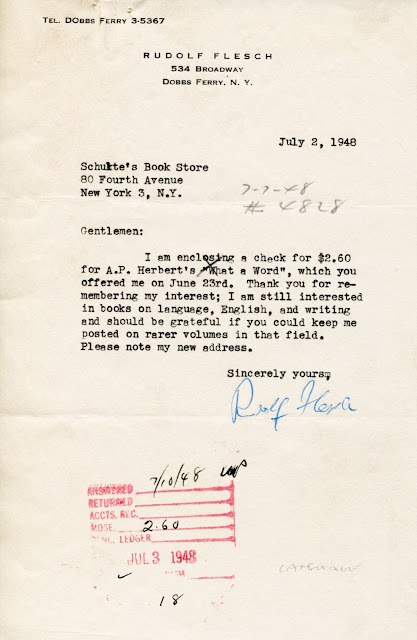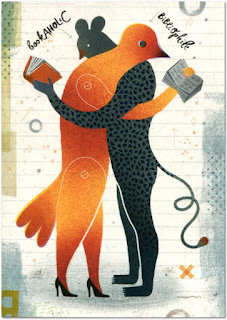A Rudolf Flesch letter to a bookseller
(high readability score!)
Rudolf Flesch (1911-1986), a writer, readability expert, and proponent of the Plain English Movement, collected books on language, English, and writing. So it comes as no surprise that a letter he wrote to a New York bookseller in 1948 included an order for a book on language and a request for more books on the subject, particularly rare books.
Flesch, an Austrian immigrant who fled to America ahead of Hitler's invasion in the 1930s, had earned a law degree in Vienna, but in his new country, his scholarly pursuits turned to Library Science (Ph.D. from Columbia University), reading, and writing about the English language.
Also in 1948, Flesch published in the Journal of Applied Psychology, A New Readability Yardstick, in which he first proposed his Reading Ease Formula, which became a standard readability formula for the U.S. Department of Defense and other government agencies.
Against this backdrop of language studies and efforts to improve readability in the post-World War II era, Flesch's 1948 letter to a bookseller provides an interesting snapshot of a process at work, underscoring the importance of a relationship with a knowledgeable and reputable bookseller. Those booksellers and relationships still exist, but the Internet era has taken its toll on both.
A concluding thought on Flesch and the books he collected in addition to the A.P. Herbert title in this letter is this: What happened to those books, Flesch's personal library, upon his death? Surely it was a substantial collection on the topics of language, reading, and writing. Was it donated to the archives of a university library or similar institution for scholarly studies? Or did his heirs inherit them? Or, hopefully not, did they scatter to the four winds? I've not been able to find "Flesch papers" or Flesch's book collection intact anywhere through online searches. In the event they sold at auction and re-entered the second-hand market, I've searched high and low for evidence of this, such as books with Flesch's bookplate (if he used ex-libris) or other marks of ownership. Taking a cue from the previous paragraph, perhaps I should find a reputable bookseller with a specialty in the subjects Flesch collected.
(high readability score!)
Rudolf Flesch (1911-1986), a writer, readability expert, and proponent of the Plain English Movement, collected books on language, English, and writing. So it comes as no surprise that a letter he wrote to a New York bookseller in 1948 included an order for a book on language and a request for more books on the subject, particularly rare books.
Flesch, an Austrian immigrant who fled to America ahead of Hitler's invasion in the 1930s, had earned a law degree in Vienna, but in his new country, his scholarly pursuits turned to Library Science (Ph.D. from Columbia University), reading, and writing about the English language.
In 1955, he wrote the classic, Why Johnny Can't Read and
What You Can Do About it, which advocated phonics for teaching students how
to read. The book was a best-seller. Parents loved it, educators not so much.
Today, more than 60 years later, cognitive neuroscientists still advocate it as
an important tool in teaching reading skills. And many educators remain
ambivalent about its use. In 1981, Flesch was compelled to write Why Johnny Still Can’t Read, but the Reading
Wars have continued to this day.
Flesch was not a fan of the
Dick and Jane books used at that time to teach children to read, but he did like Dr. Seuss
books and his praise wound up on the dust jackets of some of those books. And he
may have been indirectly responsible for Seuss’ best-known work, The Cat in the
Hat.
In the December 23, 2002 New Yorker, Louis Menand writes that John Hersey,
who like Flesch deplored the teaching methods for young readers, mentioned Dr.
Seuss as an author that publishers should consider for inspiring school children to
read. William Spaulding, director of Houghton Mifflin's education division, read both Hersey's article and Flesch's Why Johhny Can't Read and proposed a list of words similar to the word lists in Flesch's book for Seuss to use in creating a story that first graders could read. Seuss initially balked at the idea, but worked with it and the words provided him, eventually culling out those he would use to write the story.
When Flesch mailed his typed, signed letter to Schulte's Book Store to order
A.P. Herbert's What a Word, he had already published two books by this time: The Art of Plain Talk (1946)
and The Way to Write, with A.H. Lass (1947). He was working on his third book,
The Art of Readable Writing (1949) and perhaps Herbert’s book found
a place in his reference library for that project.
Against this backdrop of language studies and efforts to improve readability in the post-World War II era, Flesch's 1948 letter to a bookseller provides an interesting snapshot of a process at work, underscoring the importance of a relationship with a knowledgeable and reputable bookseller. Those booksellers and relationships still exist, but the Internet era has taken its toll on both.
A concluding thought on Flesch and the books he collected in addition to the A.P. Herbert title in this letter is this: What happened to those books, Flesch's personal library, upon his death? Surely it was a substantial collection on the topics of language, reading, and writing. Was it donated to the archives of a university library or similar institution for scholarly studies? Or did his heirs inherit them? Or, hopefully not, did they scatter to the four winds? I've not been able to find "Flesch papers" or Flesch's book collection intact anywhere through online searches. In the event they sold at auction and re-entered the second-hand market, I've searched high and low for evidence of this, such as books with Flesch's bookplate (if he used ex-libris) or other marks of ownership. Taking a cue from the previous paragraph, perhaps I should find a reputable bookseller with a specialty in the subjects Flesch collected.


Comments
Post a Comment